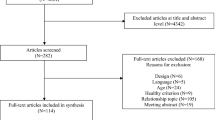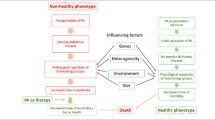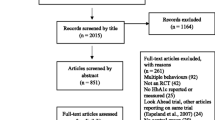Abstract
Background
Increasing self-efficacy is an effective mechanism for increasing physical activity, especially for older people.
Purpose
The aim of this review was to identify behaviour change techniques (BCTs) that increase self-efficacy and physical activity behaviour in non-clinical community-dwelling adults 60 years or over.
Methods
A systematic search identified 24 eligible studies reporting change in self-efficacy for physical activity following an intervention. Moderator analyses examined whether the inclusion of specific BCTs (as defined by CALO-RE taxonomy) was associated with changes in self-efficacy and physical activity behaviour.
Results
Overall, interventions increased self-efficacy (d = 0.37) and physical activity (d = 0.14). Self-regulatory techniques such as setting behavioural goals, prompting self-monitoring of behaviour, planning for relapses, providing normative information and providing feedback on performance were associated with lower levels of both self-efficacy and physical activity.
Conclusions
Many commonly used self-regulation intervention techniques that are effective for younger adults may not be effective for older adults.
Similar content being viewed by others
References
US Department of Health and Human Services. Physical activity guidelines for Americans: Be active, healthy and happy. US Department of Health and Human Services, Washington; 2008
UK Department of Health, start active, stay active. A report on physical activity for health from our four home countries' chief medical officer. UK Department of Health London; 2011
Warburton D, Charlesworth S, Ivey A, Nettlefold L, Bredin S. A systematic review of the evidence For Canada’s Physical Activity Guidelines for Adults. Int J Behav Nutr Phys Act. 2010; 7: 39.
Paterson D, Warburton D. Physical activity and functional limitations in older adults: A systematic review related to Canada's Physical Activity Guidelines. Int J Behav Nutr Phys Act. 2010; 7: 38.
Kesäniemi A, Riddoch CJ, Reeder B, Blair S, Sørensen T. Advancing the future of physical activity guidelines in Canada: An independent expert panel interpretation of the evidence. Int J Behav Nutr Phys Act. 2010; 7: 41.
NHS information centre for health and social care health survey for England – 2008: Physical activity and fitness. Leeds; 2009
Hobbs N, Godfrey A, Lara J, et al. Are behavioural interventions effective in increasing physical activity at 12-36 months in adults aged 55 to 70 years? A systematic review and meta-analysis. BMC Med. 2013; 11: 75.
Bandura A. Self-efficacy: The exercise of control. New York, NY: Freeman; 1997.
Bauman AE, Reis RS, Sallis JF, Wells JC, Loos RJF, Martin BW. Correlates of physical activity: Why are some people physically active and others not? Lancet. 2012; 380: 258-271.
Koeneman MA, Verheijden MW, Chinapaw MJM, Hopman-Rock M. Determinants of physical activity and exercise in healthy older adults: A systematic review. Int J Behav Nutr Phys Act. 2011; 8: 142.
Rhodes RE, Pfaeffli LA. Mediators of physical activity behaviour change among adult non-clinical populations: A review update. Int J Behav Nutr Phys Act. 2010; 7: 37.
French DP. The role of self-efficacy in changing health-related behaviour: Cause, effect or spurious association? Brit J Health Psychol. 2013; 18: 237-243.
van Stralen MM, Vries HD, Mudde AN, Bolman C, Lechner L. Determinants of initiation and maintenance of physical activity among older adults: A literature review. Health Psychol Rev. 2009; 3: 147-207.
Schwarzer R, Renner B. Social-cognitive predictors of health behavior: Action self-efficacy and coping self-efficacy. Health Psychol. 2000; 19: 487-495.
Williams SL, French DP. What are the most effective intervention techniques for changing physical activity self-efficacy and physical activity behaviour-and are they the same? Health Educ Res. 2011; 26: 308-322.
Olander EK, Fletcher H, Williams S, Atkinson L, Turner A, French DP. What are the most effective techniques in changing obese individuals' physical activity self-efficacy and behaviour: A systematic review and meta-analysis. Int J Behav Nutr Phys Act. 2013; 10: 29.
Michie S, Ashford S, Sniehotta FF, Dombrowski S, Bishop A, French DP. A refined taxonomy of behaviour change techniques to help people change their physical activity and healthy eating behaviours: The CALO-RE taxonomy. Psychol Health. 2011; 26: 1-20.
Abraham C, Michie S. A taxonomy of behaviour change techniques used in interventions. Health Psychol. 2008; 27: 379-387.
Landis JR, Koch GG. Measurement of observer agreement for categorical data. Biometrics. 1977; 33: 159-174.
Cohen JA. Power primer. Psychol Bull. 1992; 112: 155-159.
Schwarzer R. Statistics software for meta-analysis. Available at: http://userpage.fu-berlin.de/health/meta_e.htm. Accessibility verified May 2, 2013
Hunter J, Schmidt FL. Methods of meta-analysis: Correcting error and bias in research findings (second edition). Sage: Thousand Oaks, CA; 2004.
Rosenthal R, DiMatteo MR. Meta-analysis: Recent developments in quantitative methods for literature reviews. Annu Rev Psychol. 2001; 52: 59-82.
Aree-Ue S, Pothiban L, Belza B, Sucamvang K, Panuthai S. Osteoporosis preventive behavior in Thai older adults: Feasibility and acceptability. J Gerontol Nurs. 2006; 32: 23-30.
Buman MP, Giacobbi PR, Dzierzewski JM, et al. Peer volunteers improve long-term maintenance of physical activity with older adults: A randomized controlled trial. J Phys Act Health. 2001; 8: S257-266.
Clark DO, Stump TE, Damush TM. Outcomes of an exercise program for older women recruited through primary care. J Aging Health. 2003; 15: 567-585.
Connell CM, Janevic MR. Effects of a Telephone-Based Exercise Intervention for Dementia Caregiving Wives: A Randomized Controlled Trial. J Appl Gerontol. 2009; 28: 171-194.
Greaney ML, Riebe D, Ewing Garber C, et al. Long-term effects of a stage-based intervention for changing exercise intentions and behavior in older adults. Gerontologist. 2008; 48: 358-367.
Clark PG, Rossi JS, Greaney ML, et al. Intervening on exercise and nutrition in older adults: The Rhode Island SENIOR Project. J Aging Health. 2005; 17: 753-778.
Clark PG, Nigg CR, Greene G, Riebe D, Saunders SD. Study of Exercise and Nutrition in Older Rhode Islanders (SENIOR): Translating theory into research. Health Educ Res. 2002; 17: 552-561.
King AC, Pruitt LA, Phillips W, Oka R, Rodenburg A, Haskell WL. Comparative effects of two physical activity programs on measured and perceived physical functioning and other health-related quality of life outcomes in older adults. J Gerontol A Biol Sci Med Sci. 2000; 55: 74-83.
Li F, McAuley E, Harmer P, Duncan TE, Chaumeton NR. Tai Chi enhances self-efficacy and exercise behavior in older adults. J Aging Phys Act. 2001; 9: 161-171.
Li F, Harmer P, McAuley E, Fisher J, Duncan T, Duncan S. Tai chi, self-efficacy, and physical function in the elderly. Prev Sci. 2001; 2: 229-239.
McAuley E, Mailey EL, Mullen SP, et al. Growth trajectories of exercise self-efficacy in older adults: Influence of measures and initial status. Health Psychol. 2011; 30: 75-83.
McAuley E, McAuley E, Mullen S, et al. Self-regulatory processes and exercise adherence in older adults. Am J Prev Med. 2011; 41: 284-290.
McAuley E, Katula J, Mihalko SL, et al. Mode of physical activity and self-efficacy in older adults: A latent growth curve analysis. J Gerontol B Psychol Sci Soc Sci. 1999; 54: 283-292.
McAuley E, Jerome G, Elavsky S, Marquez D, Ramsey S. Predicting long-term maintenance of physical activity in older adults. Prev Med. 2003; 37: 110-118.
McAuley E, Jerome G, Marquez D, Elavsky S, Blissmer B. Exercise self-efficacy in older adults: Social, affective and behavioral influences. Ann Behav Med. 2003; 25: 1-7.
McAuley E, Elavsky S, Jerome G, Konopack J, Marquez D. Physical activity-related well-being in older adults: Social cognitive influences. Psychol Aging. 2005; 20: 295-302.
Michael YL, Carlson NE. Analysis of Individual Social-ecological Mediators and Moderators and Their Ability to Explain Effect of a Randomized Neighborhood Walking Intervention. Int J Behav Nutr Phys Act. 2009; 6: 49.
Fisher KJ, Li F. A community-based walking trial to improve neighborhood quality of life in older adults: A multilevel analysis. Ann Behav Med. 2004; 28: 186-194.
Nahm ES, Barker B, Resnick B, Covington B, Magaziner J, Brennan PF. Effects of a social cognitive theory-based hip fracture prevention web site for older adults. Comput Inf Nurs. 2010; 28: 371-379.
Nahm ES, Resnick B, Covington B. Development of theory-based, online health learning modules for older adults: Lessons learned. Comput Inform Nurs. 2006; 24: 261-268.
Petrella RJ, Koval JJ, Cunningham DA, Paterson DH. Can primary care doctors prescribe exercise to improve fitness? The Step Test Exercise Prescription (STEP) project. Am J Prev Med. 2003; 24: 316-322.
Petrella RJ, Wight D. An office-based instrument for exercise counseling and prescription in primary care. The Step Test Exercise Prescription (STEP). Arch Fam Med. 2000; 9: 339-344.
Pinto BM, Lynn H, Marcus BH, DePue J, Goldstein MG. Physician-based activity counseling: Intervention effects on mediators of motivational readiness for physical activity. Ann Behav Med. 2001; 23: 2-10.
Pinto BM, Goldstein MG, DePue JD, Milan FB. Acceptability and feasibility of physician-based activity counseling. The PAL project. Am J Prev Med. 1998; 15: 95-102.
Pinto BM, Goldstein MG, Marcus BH. Activity counseling by primary care physicians. Prev Med. 1998; 27: 506-513.
Qi BB, Resnick B, Smeltzer SC, Bausell B. Self-efficacy program to prevent osteoporosis among Chinese immigrants: A randomized controlled trial. Nurs Res. 2011; 60: 393-404.
Resnick B, Luisi D, Vogel A. Testing the Senior Exercise Self-efficacy Project (SESEP) for use with urban dwelling minority older adults. Public Health Nurs. 2008; 25: 221-234.
Rose MA. Evaluation of a peer-education program on heart disease prevention with older adults. Public Health Nurs. 1992; 9: 242-247.
Shin KR, Kang Y, Park HJ, Heitkemper M. Effects of exercise program on physical fitness, depression, and self-efficacy of low-income elderly women in South Korea. Public Health Nurs. 2009; 26: 523-531.
Temple B, Janzen BL, Chad K, Bell G, Reeder B, Martin L. The health benefits of a physical activity program for older adults living in congregate housing. Can J Public Health. 2008; 99: 36-40.
van Stralen MM, de Vries H, Mudde AN, Bolman C, Lechner L. The long-term efficacy of two computer-tailored physical activity interventions for older adults: Main effects and mediators. Health Psychol. 2011; 30: 442-452.
van Stralen MM, de Vries H, Mudde AN, Bolman C, Lechner L. The working mechanisms of an environmentally tailored physical activity intervention for older adults: A randomized controlled trial. Int J Behav Nutr Phys Act. 2009; 6: 83.
van Stralen MM, de Vries H, Bolman C, Mudde AN, Lechner L. Exploring the efficacy and moderators of two computer-tailored physical activity interventions for older adults: A randomized controlled trial. Ann Behav Med. 2010; 39: 139-150.
van Stralen MM, de Vries H, Mudde AN, Bolman C, Lechner L. Efficacy of two tailored interventions promoting physical activity in older adults. Am J Prev Med. 2009; 37: 405-417.
van Stralen MM, Kok G, de Vries H, Mudde AN, Bolman C, Lechner L. The Active plus protocol: Systematic development of two theory- and evidence-based tailored physical activity interventions for the over-fifties. BMC Public Health. 2008; 8: 399.
Anderson KJ, Pullen CH. Physical activity with spiritual strategies intervention: A cluster randomized trial with older African American women. Res Gerontol Nurs. 2013; 6: 11-21.
Dattilo J, Martire L, Gottschall J, Weybright E. A pilot study of an intervention designed to promote walking, balance, and self-efficacy in older adults with fear of falling. Educ Gerontol. 2014; 40: 26-39.
Dye CJ, Williams JE, Kemper KA, McGuire FA, Aybar-Damali B. Impacting mediators of change for physical activity among food stamp recipients. Educ Gerontol. 2012; 38: 788-798.
Irvine AB, Gelatt VA, Seeley JR, Macfarlane P, Gau JM. Web-based intervention to promote physical activity by sedentary older adults: Randomized Controlled Trial. J Med Internet Res. 2013; 15: e19.
Purath J, Keller CS, McPherson S, Ainsworth B. A randomized controlled trial of an office-based physical activity and physical fitness intervention for older adults. Geriatr Nurs. 2013; 34: 204-211.
Dombrowski SU, Sniehotta FF, Avenell A, Johnston M, MacLennan G, Araujo-Soares V. Identifying active ingredients in complex behavioural interventions for obese adults with obesity-related co-morbidities or additional risk factors for co-morbidities: A systematic review. Health Psychol Rev. 2012; 6: 7-32.
Michie S, Abraham C, Whittington C, McAteer J, Gupta S. Effective techniques in healthy eating and physical activity interventions: A meta-regression. Health Psychol. 2009; 28: 690-701.
Peters GJY, de Bruin M, Crutzen R. Everything should be as simple as possible, but no simpler: Towards a protocol for accumulating evidence regarding the active content of health behaviour change interventions. Health Psychol Rev. 2014. doi:10.1080/17437199.2013.848409.
Carver CS, Scheier MF. Attention and self-regulation: A control theory approach to human behavior. New York: Springer; 1981.
De Luca CR, Leventer RJ. Developmental trajectories of executive functions across the lifespan. In Anderson, Peter; Anderson, Vicki; Jacobs, Rani. Executive functions and the frontal lobes: A lifespan perspective. Washington, DC: Taylor & Francis. 2008:3–21
Norman DA, Shallice T. Attention to action: Willed and automatic control of behaviour. In: Davidson RJ, Schwartz GE, Shapiro D, eds. Consciousness and Self-Regulation: Advances in Research and Theory. New York: Plenum; 1986: 1-18.
Orbell S, Sheeran P. “Inclined abstainers”: A problem for predicting health-related behaviour. Br J Soc Psychol. 1998; 37: 151-165.
Allan JL, Sniehotta FF, Johnston M. The best laid plans: Planning skills determines the effectiveness of action plans and implementation intentions. Ann Behav Med. 2013; 46: 114-120 doi:10.1007/s12160-013-9483-9.
Gollwitzer PM. Implementation intentions: Strong effects of simple plans. Am Psychol. 1999; 54: 493-503.
Gollwitzer PM, Sheeran P. Implementation intentions and goal achievement: A meta-analysis of effects and processes. Adv Exp Soc Psychol. 2006; 38: 69-119.
Allan JL, Johnston M, Campbell NC. Missed by an inch or a mile? Predicting size of intention-behaviour gap from measures of executive control. Psychol Health. 2011; 26: 635-650.
Hagger M, Chatzisarantis NLD, Biddle SJH. A meta-analytic review of the theories of reasoned action and planned behavior in physical activity: Predictive validity and the contribution of additional variables. J Sport Exerc Psychol. 2002; 24: 3-32.
Löckenhoff CE, Carstensen. Socioemotional selectivity theory, aging, and health: The increasingly delicate balance between regulating emotions and making tough choices. J Pers. 2004; 76: 1395-1424.
Kassavou A, Turner A, Hamborg T, French DP. Predicting maintenance of attendance at walking groups: Testing constructs from three leading maintenance theories. Health Psychol. 2014. doi:10.1037/hea0000015.
Kassavou A, Turner A, French DP. Do interventions to promote walking in groups increase moderate physical activity? A systematic literature review with meta-analysis. Int J Behav Nutr Phys Act. 2013; 10: 18.
Acknowledgments
This review was funded by Macmillan Cancer Support and University of Manchester School of Psychological Sciences start-up funds. We are grateful to Lou Atkinson, Stefanie Williams and Helen Fletcher for coding intervention descriptions.
Authors’ Statement of Conflict of Interest and Adherence to Ethical Standards
Authors French, Olander, Chisholm, and Mc Sharry declare that they have no conflict of interest. All procedures, including the informed consent process, were conducted in accordance with the ethical standards of the responsible committee on human experimentation (institutional and national) and with the Helsinki Declaration of 1975, as revised in 2000.
Author information
Authors and Affiliations
Corresponding author
About this article
Cite this article
French, D.P., Olander, E.K., Chisholm, A. et al. Which Behaviour Change Techniques Are Most Effective at Increasing Older Adults’ Self-Efficacy and Physical Activity Behaviour? A Systematic Review. ann. behav. med. 48, 225–234 (2014). https://doi.org/10.1007/s12160-014-9593-z
Published:
Issue Date:
DOI: https://doi.org/10.1007/s12160-014-9593-z




